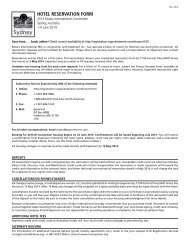A Guide for Host Families (PDF) - Rotary International
A Guide for Host Families (PDF) - Rotary International
A Guide for Host Families (PDF) - Rotary International
Create successful ePaper yourself
Turn your PDF publications into a flip-book with our unique Google optimized e-Paper software.
A GUIDE<br />
FOR HOST<br />
FAMILIES
Definitions<br />
Outbound student<br />
A term applied by sending districts to students they support <strong>for</strong> an exchange<br />
in another country.<br />
Inbound student<br />
A term applied by host districts to students they receive from another country<br />
<strong>for</strong> an exchange.<br />
Sending district<br />
The <strong>Rotary</strong> district in the student’s home country that facilitates the exchange<br />
to another country.<br />
<strong>Host</strong> district<br />
The <strong>Rotary</strong> district that receives a student from another country.<br />
<strong>Host</strong> families work closely with the host district.<br />
<strong>Host</strong> club<br />
The <strong>Rotary</strong> club that supports the student during the course of the exchange.<br />
<strong>Host</strong> counselor<br />
Member of the host club appointed to serve as the exchange student’s main<br />
contact with the club and to act as a liaison between the student, club, host<br />
family, and community. This individual must not be a member of the student’s<br />
host family.<br />
Youth Exchange officer<br />
A Rotarian appointed or elected to hold an office on a district or club<br />
Youth Exchange committee. Selected by the district governor, the district<br />
Youth Exchange chair oversees activity related to the program throughout<br />
an entire district.
Contents<br />
Introduction 3<br />
<strong>Rotary</strong> and the Youth Exchange Program 4<br />
Requirements of the <strong>Host</strong> Family 6<br />
Youth Exchange Students 8<br />
The Roles of the <strong>Host</strong> and Sending Districts 14<br />
Youth Protection 16<br />
How to Apply to Be a <strong>Host</strong> Family 16<br />
This guide serves as a general introduction to<br />
<strong>Rotary</strong> Youth Exchange and provides an overview<br />
of host family expectations and responsibilities.<br />
Detailed in<strong>for</strong>mation should be covered during<br />
orientation sessions arranged by local Rotarians.<br />
It is recommended that you attend all sessions to<br />
fully understand the integral role of the host family<br />
in the Youth Exchange program.
Introduction<br />
A host family is a vital part of the cultural exchange, immersing the student<br />
in a variety of activities while in the host country. The host family plays a<br />
large role in offering the student a view of another country and gains the<br />
opportunity to learn about a new culture from a young leader. The following<br />
in<strong>for</strong>mation will help prepare host families willing to explore the challenge<br />
of welcoming a student into their home <strong>for</strong> a meaningful exchange.<br />
<strong>Host</strong>ing is a tremendous experience in which you can share in a young<br />
person’s hopes and dreams and develop a lifelong connection with a<br />
student and family from another country. It can be challenging to help a<br />
young person transition to a new culture and ease into the surroundings<br />
but the rewards are immeasurable.<br />
<strong>Host</strong> families in the Youth Exchange program come in all shapes and sizes.<br />
They can be Rotarians or non-Rotarians, and may include young children,<br />
older children, or no children at all.<br />
3
<strong>Rotary</strong> and the<br />
Youth Exchange program<br />
4<br />
What is <strong>Rotary</strong>?<br />
<strong>Rotary</strong> clubs are service organizations that strive to improve<br />
the quality of life in their communities, promote high ethical<br />
standards in all vocations, and help build goodwill and peace.<br />
There are over 33,000 <strong>Rotary</strong> clubs in the world. Club members, called<br />
Rotarians, are business, professional, and community leaders who volunteer<br />
their time and talents to serve others. <strong>Rotary</strong> Youth Exchange is one of their<br />
service activities.<br />
A district is a group of <strong>Rotary</strong> clubs that are linked <strong>for</strong> administrative<br />
purposes. Sometimes districts join together to <strong>for</strong>m multidistricts that<br />
coordinate exchanges in a larger geographic area.<br />
<strong>Rotary</strong> <strong>International</strong>, as the association of<br />
<strong>Rotary</strong> clubs throughout the world, encourages<br />
clubs and districts to undertake Youth Exchange<br />
activities and offers support through publications<br />
and administration relevant to every <strong>Rotary</strong><br />
district. Districts operate their Youth Exchange<br />
programs independently of RI but within a<br />
policy framework that supports student safety<br />
and well being.<br />
The Youth Exchange program is distinctive<br />
because it is operated completely by volunteers<br />
around the world. Each district arranges its own<br />
exchanges with other districts. <strong>Host</strong> families are<br />
screened, interviewed, selected, and supported<br />
by their respective club or district. As a host<br />
family, you should be in close contact with<br />
members of your local <strong>Rotary</strong> club and district.
What is Youth Exchange?<br />
Each year, about 8,000 students from over 100 countries and<br />
geographical areas participate in exchanges through the Youth<br />
Exchange program. There are three types of exchanges:<br />
• Long-term: This exchange is open to students ages 15-19 and usually<br />
lasts 10-12 months. The student lives with more than one family in the<br />
host country and is required to attend school. Long-term exchanges<br />
may be extended to include all or part of the holiday/vacation periods<br />
immediately be<strong>for</strong>e or after the academic year.<br />
• Short-term: This exchange is open to students ages 15-19 and ranges<br />
from several days to several weeks. It often takes place when school<br />
is not in session, and usually does not include an academic program.<br />
Short-term exchanges typically involve a <strong>Rotary</strong> district-organized<br />
exchange of a son or daughter between two families, but they may also<br />
take the <strong>for</strong>m of international youth camps or tours that bring together<br />
groups of students from many countries.<br />
• New Generations: This specialized short-term exchange lasts from<br />
three weeks to three months and is open to young people ages 18-25.<br />
This program may include a vocational element.<br />
5
Requirements of the host family<br />
What is expected of a host family?<br />
<strong>Host</strong>ing a student can be an extremely rewarding experience <strong>for</strong> everyone<br />
in the family, yet it is a role that requires a lot of responsibility. <strong>Host</strong> families<br />
are to meet the following expectations:<br />
Be<strong>for</strong>e the student arrives<br />
• Participate in training and orientation sessions offered by the club or<br />
district.<br />
• Establish communication with the student.<br />
• Understand the program rules that the student must follow.<br />
• Know how to contact key Rotarians involved inYouth Exchange and<br />
community services in case of an emergency.<br />
During the exchange<br />
• Provide a safe and welcoming environment <strong>for</strong> trust and friendship to<br />
develop between the student and your family.<br />
• Support and make the student feel like a part of the family, with the<br />
same privileges and obligations.<br />
• Gently encourage the student to learn and adopt most of the ways of<br />
your household.<br />
• Provide room and board <strong>for</strong> the student. All students must have their<br />
own bed. If the student must share a room, it should be with a child of<br />
the same gender and similar age.<br />
• Provide a place in the home where the student may study in private.<br />
• Recognize the student’s birthday and other special occasions.<br />
• Ensure the student knows how to contact family members, friends,<br />
and other support networks.<br />
6
• In case of an emergency, know how to access and use the student’s<br />
travel insurance policy.<br />
• Voice any concerns and questions regarding the student to the<br />
Rotarian host counselor, including serious homesickness, difficulty<br />
adapting to family life or school, or illness.<br />
• Maintain close contact with the host club, and address problems and<br />
concerns quickly.<br />
• Exercise supervisory and parental responsibility to ensure the student’s<br />
well being.<br />
• Encourage involvement in community life by introducing the student<br />
to neighbors, friends, and local groups.<br />
• Teach the student about the local culture, and learn about the student’s<br />
culture.<br />
• Advise the student about matters related to school, family, community<br />
functions, and friendship.<br />
How long will the student be living with my family?<br />
Most long-term exchange students live with two or three host families<br />
during their exchange. This means the student may live with you <strong>for</strong><br />
anywhere between three and six months.<br />
Are host families paid?<br />
No. However, in some countries, you may be entitled to a tax deduction.<br />
Please check with your government to see if you are eligible.<br />
Some anxiety is to be expected if you have never hosted an exchange student.<br />
Be sure you are com<strong>for</strong>table with the idea be<strong>for</strong>e committing to serve as a<br />
host family. If you have serious reservations, feel that you cannot meet your<br />
obligations, or do not have adequate answers to your questions, please contact<br />
a local Rotarian.<br />
7
Youth Exchange Students<br />
What rules are exchange students expected to follow?<br />
Students are expected to<br />
• Learn and follow the family’s rules<br />
• Follow the local laws and customs in the exchange country<br />
• Refrain from driving or operating a motorized vehicle of any kind<br />
• Abide by <strong>Rotary</strong> <strong>International</strong> and district- and club-specific rules<br />
District and club rules will be explained in orientation sessions. <strong>Host</strong><br />
families are encouraged to establish rules and expectations early in areas<br />
such as:<br />
• Normal household routines,<br />
including meal times, bedtimes,<br />
and study hours<br />
• Curfews<br />
• House keys<br />
• Emergency procedures,<br />
including phone numbers<br />
• Local transportation<br />
• Snacks and meals<br />
• Religious practices<br />
• Inviting friends home<br />
• Phone and computer use<br />
8
What are the consequences if a student breaks a rule?<br />
Within your home, you should set consequences <strong>for</strong> the exchange<br />
student as you would <strong>for</strong> your own child. Make sure that the rules and<br />
consequences are very clear to the student. If problems arise or a student<br />
breaks a rule, it is the responsibility of the host family to contact the club<br />
or district Youth Exchange officer to share any major issues that arise. In<br />
extreme cases, the host club and district may decide that it is best <strong>for</strong> the<br />
student to return home early. The final decision regarding a student’s early<br />
return is made by the governor of the host district in consultation with the<br />
district Youth Exchange committee.<br />
What is my role with the exchange student’s school?<br />
All long-term exchanges require students to attend a full academic program.<br />
As the host family, you are expected to ensure that the student becomes<br />
acclimated to a new school. Understand that the student may be coming<br />
from a vastly different educational system and may need some guidance<br />
about local school procedures. For this reason, the first host family should<br />
consider visiting the school counselor with the student to tour the grounds<br />
and ensure that he or she is com<strong>for</strong>table with the class schedule.<br />
Advise the student against taking a rigorous course load while adjusting to<br />
a new culture, language, and school. Make sure the student knows the way<br />
to and from school, transportation options, and the procedure <strong>for</strong> getting<br />
lunch.<br />
9
10<br />
What challenges might the student experience during the<br />
exchange?<br />
• Homesickness<br />
• Language difficulty<br />
• Challenges making new friends<br />
• Difficulty interpreting culture-specific social cues<br />
• <strong>Host</strong>-family conflicts<br />
• Different rules and expectations from their home<br />
• Various emotional difficulties<br />
How will I know when the student is facing these difficulties?<br />
• Does not seem to be learning the language of the host country<br />
• Does not talk about new friends or positive activities<br />
• Spends excessive time alone<br />
• Calls home frequently or spends too much time online<br />
• Becomes irritable or has angry outbursts<br />
• Becomes anxious or depressed<br />
• Does not per<strong>for</strong>m well in school<br />
What should I do?<br />
• Talk to the student about the signs you are seeing.<br />
• Ask open-ended questions, allowing the student to talk freely.<br />
• Help the student find activities to become involved in.<br />
• Offer or help arrange <strong>for</strong> additional language assistance.<br />
• Encourage the student to talk to the Rotarian host counselor.<br />
• Notify the student’s host counselor if the student is encountering any<br />
exceptional problems such as illness, significant difficulty adapting<br />
to the host family or school, anxieties about family matters, or serious<br />
homesickness.
How are students selected?<br />
Students who demonstrate flexibility and an open mind, have an<br />
above-average academic record, and are involved in community and<br />
extracurricular activities are encouraged to apply. All students who meet<br />
these qualifications, including children of Rotarians and candidates with<br />
disabilities, are urged to consider the program.<br />
Though the application process varies from district to district, students<br />
generally apply through their local club and complete a series of written<br />
applications coupled with an interview process.<br />
What is covered during the student’s orientation<br />
sessions?<br />
The sending and host districts will provide orientation sessions <strong>for</strong><br />
exchange students be<strong>for</strong>e and after their arrival in the host country. The goal<br />
of these sessions is to explain the program’s expectations <strong>for</strong> the students<br />
and prepare them <strong>for</strong> their time abroad.<br />
What obligations do exchange students have to <strong>Rotary</strong>?<br />
Students are expected to prioritize <strong>Rotary</strong> functions, such as club or district<br />
meetings, above other extracurricular and host family activities. They<br />
will be asked to give speeches at <strong>Rotary</strong> events detailing their exchange<br />
experiences. <strong>Host</strong> families may be invited to <strong>Rotary</strong> functions; your<br />
attendance may help the student feel more com<strong>for</strong>table. Ask local Rotarians<br />
about the events your student is expected to attend, and ensure that the<br />
student prioritizes them.<br />
How can I best prepare to host a student?<br />
Be<strong>for</strong>e the exchange, learn as much as you can about the student’s culture,<br />
which may help prevent misunderstandings. Also, think about which<br />
aspects of your culture you would like to share with the student, such as<br />
types of food, entertainment, and local places of interest.<br />
In addition, contact the student and his or her parents as soon as Rotarians<br />
provide the student’s name and contact in<strong>for</strong>mation. You may extend a<br />
welcome and tell them about your family. The student may also appreciate<br />
your input on what types of clothing to bring and in<strong>for</strong>mation about your<br />
community.<br />
11
How should I welcome the student into my country?<br />
A member of the student’s first host family should join Rotarians at the<br />
airport upon the student’s arrival.<br />
Many host families arrange an in<strong>for</strong>mal welcome party <strong>for</strong> the exchange<br />
student. Though students enjoy these gatherings as an excellent way to meet<br />
family friends and community members, consider holding this event at least<br />
a week after the student has arrived. Many students find it overwhelming to<br />
have a welcome party immediately after they get off the plane. The student<br />
may be very tired and need a few days to recover from jet lag.<br />
<strong>Host</strong> families should be prepared to discuss household rules with their<br />
student. This conversation is often best accomplished using the “first-night<br />
questions” offered by many districts. Examples of these include “Should I<br />
wash my own clothes?”and“May I help myself to food and drink at any<br />
time, or should I ask first?” Some families expect everyone to share tasks<br />
such as bed making and house cleaning, while some do not. It is best to<br />
cover these issues soon after the student has arrived.<br />
What if the student doesn’t speak my language well?<br />
Most students have a basic knowledge of the host country’s language, but<br />
book knowledge often does not prepare them <strong>for</strong> daily language use. Be<br />
open to potential misunderstandings and frustrations that may accompany<br />
communication with the student. Speak slowly, avoid using idioms, and be<br />
patient.<br />
12
Make sure that the student understands important in<strong>for</strong>mation, such as<br />
household rules, school issues, and transportation options. Do not hesitate<br />
to ask the student to repeat in<strong>for</strong>mation back to you, and encourage the<br />
student to ask <strong>for</strong> clarification. As you help conquer the language barrier,<br />
you will be able to take great pride in the student’s accomplishments and<br />
will likely create an especially close bond that will last <strong>for</strong> many years.<br />
How can I help the student adapt to my country?<br />
It is common <strong>for</strong> students and host families to have misconceptions of each<br />
other’s cultures. What you may consider to be rude or unacceptable may<br />
be normal behavior in the student’s culture and vice versa. It is important<br />
to communicate clearly with your exchange student about any cultural<br />
misunderstandings. Your district may also offer intercultural orientation to<br />
address such concerns.<br />
Try to treat the student as a member of your family rather than as a guest.<br />
Also, think of how you would like your own child to be treated on an<br />
exchange, and implement these ideas in your home.<br />
<strong>Host</strong> parents are encouraged to have students address them with an<br />
in<strong>for</strong>mal title, such as “mom”or “dad,”so they feel part of the family. Find<br />
a title that both you and the student are com<strong>for</strong>table with. Developing a<br />
strong relationship will ensure a positive experience <strong>for</strong> everyone.<br />
How do I learn about my student’s medical history and<br />
needs?<br />
The host district will have the student’s recent medical history with the<br />
application materials. You should be in<strong>for</strong>med of any special medical needs,<br />
such as medications, allergies, dietary requirements, and prescription<br />
glasses or contact lenses.<br />
Students are required to have their own medical insurance. Ask <strong>for</strong> a copy<br />
of this policy and any additional medical documentation to keep on file<br />
while the student is living with you. <strong>Host</strong> families are not responsible <strong>for</strong><br />
exchange student medical expenses.<br />
Students may have special dietary needs related to health, religion, or<br />
personal preference. Encourage them to try new foods, but always respect<br />
their preferences, and do not <strong>for</strong>ce foods upon them.<br />
13
The roles of the host<br />
and sending districts<br />
What is the role of the sending district?<br />
Once the student is accepted into the program, the sending district<br />
works with the host district to ensure a successful exchange experience.<br />
The Rotarians in the sending district will take care of the logistics that<br />
accompany the exchange. This includes but is not limited to<br />
• In<strong>for</strong>ming the host club or district of the student’s travel itinerary<br />
• Arranging an outbound orientation session <strong>for</strong> students and their<br />
parents, covering topics such as financial obligations, rules <strong>for</strong> the<br />
students, parental visits, insurance, what to expect while on the<br />
exchange, and preparing <strong>for</strong> return<br />
• Coordinating a debriefing session when the student returns from<br />
overseas<br />
What is the role of the host district?<br />
The host district is responsible <strong>for</strong> locating, screening, and supporting host<br />
families while aiming to provide students with a positive experience abroad.<br />
Other responsibilities of the host district or club include:<br />
Program administration<br />
• Facilitating discussion of needs and expectations between the host<br />
family and the student<br />
• Arranging a monthly allowance <strong>for</strong> the student (on long-term<br />
exchanges only)<br />
• Meeting with the host family in the home be<strong>for</strong>e and during the<br />
exchange to ensure the student’s needs are being met<br />
• Approving travel outside the district (Be aware that your student may<br />
have special visa restrictions <strong>for</strong> travel outside your country.)<br />
14
School<br />
• Regularly communicating with the<br />
student’s guidance counselor and<br />
teachers<br />
• Arranging enrollment, paying<br />
<strong>for</strong> tuition, and addressing other<br />
educational matters with the local<br />
secondary school (<strong>for</strong> long-term<br />
exchanges)<br />
Training<br />
• Conducting an orientation <strong>for</strong><br />
inbound students covering topics<br />
such as logistics, finances, rules, and<br />
parental visits<br />
• Creating and maintaining policies and procedures to protect students<br />
from sexual abuse and harassment<br />
Activities<br />
• Encouraging student attendance at weekly club meetings, fundraisers,<br />
and service projects, and student participation in many club events<br />
• Encouraging the student to participate in school and community<br />
activities (Be<strong>for</strong>e the exchange, Rotarians will learn about the student’s<br />
interests and should plan to introduce the student to groups involved<br />
in related activities.)<br />
• Organizing social and cultural functions <strong>for</strong> the student<br />
Student support<br />
• Meeting the exchange student on arrival<br />
• Providing a 24-hour point of contact and a list of local resources<br />
• Maintaining contact with the student and host families during the<br />
exchange through the Rotarian host counselor<br />
• Arranging transportation to and from mandatory <strong>Rotary</strong> club and<br />
district events<br />
15
Youth protection<br />
What safety precautions are taken?<br />
Both the host and sending districts must be certified by <strong>Rotary</strong> <strong>International</strong><br />
to participate in the Youth Exchange program. The certification program<br />
supports student safety by establishing requirements <strong>for</strong> youth protection<br />
and best practices in exchange program operations. All districts adopt the<br />
following Statement of Conduct <strong>for</strong> Working with Youth in addition to<br />
developing an extensive district abuse and harassment prevention or youth<br />
protection policy.<br />
How to apply to be a host family<br />
How do I apply to become a host parent?<br />
Generally, host parents must complete a written application, which includes<br />
program rules and requirements, a signed compliance statement, and<br />
authorization <strong>for</strong> reference checks. Because the program is decentralized,<br />
however, the application process varies from district to district. Contact local<br />
Rotarians <strong>for</strong> details.<br />
16<br />
Statement of Conduct <strong>for</strong> Working with Youth<br />
<strong>Rotary</strong> <strong>International</strong> strives to create and maintain a safe environment <strong>for</strong> all<br />
youth who participate in <strong>Rotary</strong> activities. To the best of their ability, Rotarians,<br />
Rotarians’ spouses and partners, and other volunteers must safeguard the<br />
children and young people they come into contact with and protect them from<br />
physical, sexual, and emotional abuse.
One <strong>Rotary</strong> Center<br />
1560 Sherman Avenue<br />
Evanston, IL 60201-3698 USA<br />
www.rotary.org<br />
749-EN—(709)


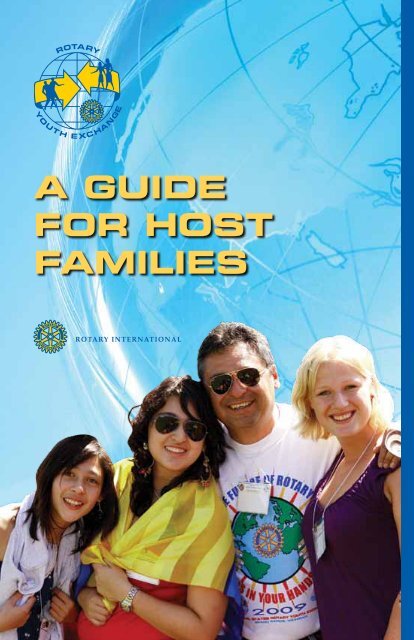
![La présidence du club [222-FR] - Rotary International](https://img.yumpu.com/25855726/1/190x245/la-presidence-du-club-222-fr-rotary-international.jpg?quality=85)

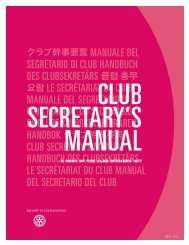

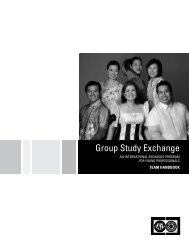
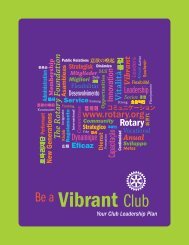
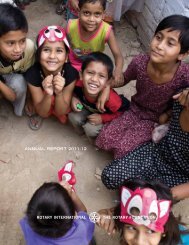
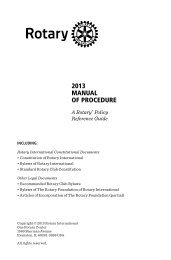


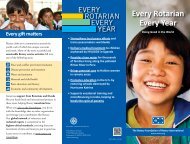
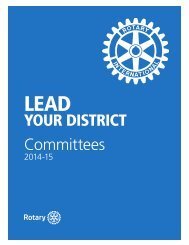

![La conférence de district [800-FR] - Rotary International](https://img.yumpu.com/25855636/1/190x245/la-conference-de-district-800-fr-rotary-international.jpg?quality=85)
